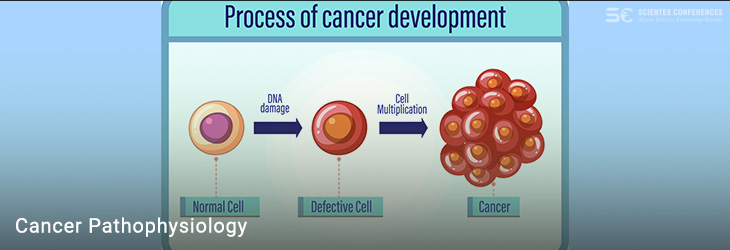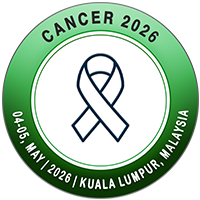Track: Cancer Pathophysiology

The session titled "Cancer Pathophysiology" is designed to provide a deep understanding of the biological and molecular processes that drive cancer. Understanding the pathophysiological processes that drive cancer is crucial for developing effective therapies and improving patient outcomes.
This Cancer Pathophysiology aims to cover critical aspects of cancer biology, from genetic mutations and epigenetic changes to tumor microenvironment and therapeutic resistance, offering a comprehensive overview of the factors that contribute to the disease.
Genetic Mutations segment of the session will explore the types of genetic mutations commonly associated with cancer, such as point mutations, insertions, deletions, and chromosomal rearrangements.
Epigenetic Changes play a significant role in cancer and this part of the session will focus on how these changes contribute to cancer by silencing tumor suppressor genes or activating oncogenes, and how they can be targeted therapeutically.
Cancer Cell Biology segment will focus on the unique characteristics of cancer cells, including their ability to evade apoptosis, sustain proliferative signaling, and avoid immune destruction.
Cancer Metastasis and Metabolism sub-session will examine the processes involved in metastasis, invasion and colonization of distant organs. Additionally, the altered metabolism of cancer cells, which supports their rapid growth and survival under adverse conditions, will be discussed.
The importance of the Tumor microenvironment in determining the efficacy of therapies will also be highlighted in this session portion.
Angiogenesis, part of the session will cover the molecular mechanisms that regulate angiogenesis, such as the role of vascular endothelial growth factor (VEGF), and discuss how inhibitors are used in cancer treatment.
Inflammation and Cancer segment will explore the link between inflammation and cancer, including how inflammatory cells and cytokines can enhance cancer cell survival, proliferation, and metastasis.
Understanding Therapeutic Resistance mechanisms is crucial for developing new strategies to overcome resistance and improve the efficacy of cancer treatments.
Scientific Highlights
- Cancer Research Therapy and Autoimmune Diseases
- Cancer Biology and Biomarkers
- Types and Causes of Cancer
- Hematology in Cancer
- Organ Specific Cancer
- Cancer: Awareness, Lifestyle and Nutrition
- Oncology Subspecialties
- Advancements in Cancer Imaging Technologies
- Cancer Genomics and Epidemiology
- Cancer and Immunology
- Tumor Pathology and Cancer Cytopathology
- Cancer Pathophysiology
- Neuro and Radiation Oncology
- Stem Cell, Gene Therapy and CAR-T Cell Therapy
- Prevention and Palliative Care in Cancer
- Rehabilitation of Cancer Survivors
- Cancer Screening and Diagnosis
- Clinical Trials of Cancer
- Cancer Treatment and Traditional Therapies
- Complementary and Alternative Cancer therapy
- Artificial Intelligence in Cancer Research
- Future Technology in Oncology
- COVID-19 and Its Impact on Cancer


